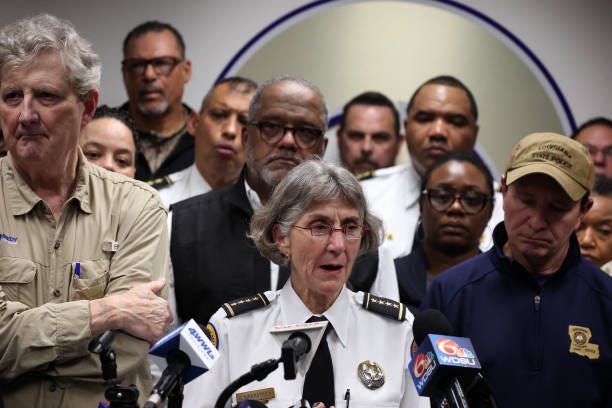
Call it what you want — SNOLA, Sneauxpocalypse, Enzo — but one thing has become clear: the oversight and response to this historic winter storm went off surprisingly well for a city that rarely sees one inch of snow, let alone ten.
Continued reporting confirms that around the area, there've been no serious accidents, no fatal crashes, and violent crimes remain minimal.
Many are thanking NOPD for doing their part as they diligently patrol, secure, and blockade roadways to reduce reckless behavior.
WWL's Dave Cohen interviewed NOPD Chief Anne Kirkpatrick, who gave listeners the rundown on her experience preparing and managing a police force that, for the most part, had never been challenged to perform on ice.
Kirkpatrick spent the past few days traveling from checkpoint to checkpoint in a souped-up 4x4 golf kart checking in on stationed officers. She explained, “So many of our officers have never seen snow, and one of the biggest challenges was driving in it. We had them practice driving in the snow in a big empty parking lot.”
Kirkpatrick has experience as a police chief in two cities well acquainted with snow and frozen conditions. However, she explained that New Orleans did very well despite its inexperience with wintry conditions.
“I think the best thing was that we started to close streets before the ice hit and avoided major accidents on the interstate," Kirkpatrick said. "We got ahead of the game. I lived in two different cities as a police chief with snow—places that sometimes take it for granted; they let people on the interstate and the next thing you know there’s a 50-car pile-up. We didn’t do that, and I do think that’s a positive lesson we can replicate.”
At times the NOPD faced challenging decisions, like that of re-closing the Crescent City Causeway late on Wednesday after re-opening it for limited traffic shortly before. (The CCC has now reopened with officers stationed on the off-ramp on Tchoupitoulas ensuring drivers safely enter and exit the bridge.)
“We do know it impacts convenience,” Kirkpatrick said. “But if you’ve ever been in a snowy ditch, you know what it means to be inconvenienced. More importantly, we wanted to prevent anyone from being injured or any fatalities. So I understand it was inconvenient, but it was going to be inconvenient one way or the other."
While today's weather has caused significant melting, Kirkpatrick understands that risks remain, both on the road and off.
“We're on the third day of being inbound, you’re going to have cabin fever. Tensions rise… This is an opportunity when domestic violence increases, when people are shut up together. So I do want people to be mindful of that. But get out if you have to, and get out before nightfall when the ice comes again.”
Officer fatigue is another prescient issue for the NOPD, given they only currently have around 900 officers, which is low given the force used to range between 1,200-1,5000. Now, with the winter storm, the NOPD has been pushing its staff even harder than usual.
“When you work your officers too much and professional staff you create burnout," Kirkpatrick explains. "Yet our staffing and needs in our city for police services don't go away. So that means we’re extending very long hours on these officers… They’re doing an amazing job. Do you imagine how much better we could service the city if we had 1,200 to 1,500 officers? But they’ve been incredible with what we have."
The interview ended with security plans for upcoming major events—events that New Orleans law officers are very much accustomed to.
Concerning the Super Bowl and Mardi Gras Kirkpatrick said in closing, “I know the plans are solid and we will certainly have lessons learned with after-action reports coming back after the terrorist attack… They’re very, very solid plans. The plans will allow people to come out and really enjoy New Orleans. And we aren't going to step on the culture either. We’re going to be able to make both exist at the same time. The culture will remain, and security will enhance."
